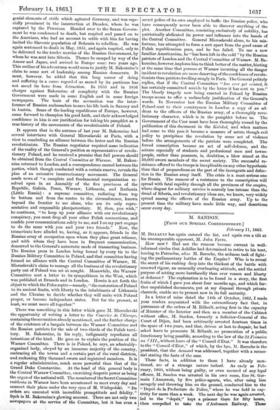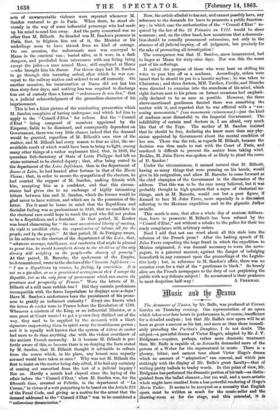M. SANDON.
[Fnolf OUR SPECIAL CORRESPONDENT.]
February 11, 1863. M. BILLAULT has again entered the list, and again run a tilt at his unconquerable opponent, M. Jules Fevre.
How now ? Had not the rumour become current in well- informed circles that Achilles had determined to retire to his tent, leaving to Patroclus, alias M. Baroche, the arduous task of fight- ing the parliamentary battles of the Empire? Who is to reveal the secret of his rushing deep into the thickest of the battle with renewed vigour, an unusually overbearing attitude, and the settled purpose of setting more barefacedly than ever reason and liberty at defiance ? The explanation is to be found in a story, the first fruits of which I gave you about four months ago, and which fur- ther unpublished documents, put at my disposal through private channels, enable me to present now in its full maturity.
In a letter of mine dated the 14th of October, 1862, I made your readers acquainted with the extraordinary fact that, in pursuance of the orders of M. Billault, acting first in the capacity of Minister of the Interior and then as a member of the Cabinet without office, M. Sandon, formerly a Solicitor-General of the Court of Dijon, had been arbitrarily arrested fourteen times in the space of two years, and that, driven at last to despair, he had asked leave to prosecute M. Billault, no prosecution of a public functionary being possible, according to the law of the 22 Fri maire an VIII., without leave of the " Conseil d'Etat." It was therefore to the "Conseil d'Etat," of which, by the bye, N. Baroche is the president, that the demand was addressed, together with a memo- rial stating the facts of the case.
These facts, in addition to those I have already men- tioned, are of a strange nature indeed. As early as Feb- ruary, 1800, without being guilty, or even accused of any legal offence, M. Sandon was arrested in his own room, Rue St. Ger- main l'Auxerrois, by five police-agents, who, after using him savagely and throwing him on the ground, conducted him to the "Depot de la Prefecture de Police," where he was held in cap- tivity for more than a week. The next day he was again arrested, led to the "depot," kept a prisoner there for fifty hours, then compelled to take the d'Aubusson Railway. These acts of unwarrantable violence were repeated whenever M. Sandon ventured to go to Paris. When there, he stood ob- viously in the way of some influential personage who had made up his mind to send him away. And the party concerned was no other than M. Billault. So dreaded was M. Sandon's presence in Paris, that, to frighten him out of it, the Minister or his underlings seem to have shrunk from no kind of outrage. On one occasion, the unfortunate man was conveyed to Mama in the convicts' van ; buried alive, as it were, in a dark dungeon, and precluded from intercourse with any living being except the jailer—a man named Heve, still employed at Mazas —who brought him his dinner. For eleven days had M. Sandon to go through this torturing ordeal, after which he was con- veyed to the railway station and ordered to set off instantly. On another occasion, his incarceration at I■lazas did not last less than sixty-four days, and nothing less was required to discharge him out of custody than a formal " ordonnance de non lieu," that is, a judicial acknowledgment of the groundless character of his imprisonment.
This is but a faint picture of the unrelenting persecution which M. Sandon complains of having undergone, and which led him to apply to the "Conseil d'Etat" for redress. But the "Conseil d'Etat" being composed of members appointed by the Emperor, liable to be dismissed, and consequently dependent on Government, there was very little chance indeed that the demand would be granted, regardless of M. Billault's own view of the matter, and M. Billault had every reason to fear Ult éclat, the un- avoidable result of which would have been to bring to light, among many other things of a rather unpleasant kind, that, in 1849, the quondam Sub-Secretary of State of Louis Philippe had left no stone unturned to be elected deputy ; that, after being ousted in the department of the Loire Inferieure, then in the department of Saone et Loire, he had hunted after fortune in that of the Haute Vienne; that, in order to secure the sympathies of the electors, he had courted the support of M. Sandon, making friends with him, accepting him as a confidant, and that this circum- stance had given rise to an exchange of highly interesting
letters between him and hi. Sandon, which the former would be glad never to have written, and which are in the possession of the latter. For it must be borne in mind that the Republican and Socialist feeling was so predominant in 1849, that no candidate in the electoral race could hope to reach the goal who did not profess to be a Republican and a Socialist. At that period, M. Rouher
was heard clamouring for "the most unrestricted liberty of meeting,
the right to establish clubs, the organization of labour, all for the people, and by the people." At that period, M. de Persigny swore, in his address to the electors of the department of the Loire, that, "whatever courage, intelligence, and resolution God might be pleased to grant him, he would henceforth devote to the abolition of the only slavery still weighing on the people—the slavery of poverty." At that period, M. Baroche, the spokesman of the Empire, be it remembered, wrote to the electors of the Charente Infe'rieure :— "I am a Republican by reason, bg feeling, by conviction. It is not as a pis-aller, or as a provisional arrangement that I accept the Republic, but as the only form of government which can ensure the greatness and prosperity of France." Were the letters of M. Billault of a still more reddish hue? Did they contain professions incompatible with the fierce Imperialism he displays now-a-days ? Have M. Sandon's misfortunes been the punishment of his prone- ness to gratify an indiscreet curiosity ? Every one knows what the 'cares de cachet were in France before the Revolution of 1789. Whenever a mistress of the Bing, or an influential Minister, or a man great at Court wanted to get a person they disliked out of the way, they used to be supplied by the monarch with a blank signature empowering them to spirit away the troublesome person ; and it is equally well known that the system of lettres de cachet had more to do than anything else with the violent overthrow of the ancient French monarchy. Is it because M. Billault is per- fectly aware of this, or because there is no denying the facts stated by M. Sandon, that M. Billault thought it advisable to refrain from the course which, in his place, any honest man unjustly accused would have taken at once? Why was not M. Billault the first to insist on the matter being duly sifted, if he had any certainty of coming out unscathed from the test of a judicial inquiry ? But no. Hardly a month had elapsed since the laying of the affair before the "Conseil d'Etat," when M. Sandon was, for the fifteenth time, arrested at Felletin, in the department of "La Creme," in virtue of a writ purporting to be based on the Article 373 of the Penal Code, and giving as a motive for the arrest that the demand addressed to the " Conseil d'Etat" was to be considered a "calumnious denunciation." Now, the article alluded to has not, and cannot possibly have, any reference to the demands for leave to prosecute a public function- in which case the authorization of the "Conseil d'Etat" re- quired by the law of the 22 Frimaire an VIII. would be sheer nonsense ; and, on the other hand, how monstrous that a denuncia- tion should be roundly pronounced calumnious, not only in the absence of all judicial inquiry, of all judgment, but precisely for the sake of preventing all investigation !
The consequence was that M. Sandon, anew incarcerated, had to linger at Mama for sixty-nine days. Nor was this the worst part of his sufferings.
It suited the purpose of those who were bent on stifling his voice to pass him off as a madman. Accordingly, orders were issued that he should be put in a lunatic asylum ; he was taken to Charenton; and three docters, MM. Tardieu, Foville, and Blanche were directed to examine into the soundness of his mind, which eight doctors sent to his prison on former occasions had emphati- cally declared to be as sane as possible. However, the three above-mentioned gentlemen fancied there was something the matter with it, and reported that he was afflicted with a "rea- soning monomania," (une monomanie raisonneuse)—just the kind of madness most distasteful to the Imperial Government. The infallibility of certain mad doctors is, I am afraid, very much like that of the Pope. The mother of M. Sandon insisted that he should be free, declaring she knew more than any phy- sician appointed by Government about the mental condition of her son. There was the rub, as regards M. Billault, because the decision was thus made to rest with the Court of Paris, and rendered it difficult to prevent the matter from taking wind. Besides, M. Jules Favre was spoken of as likely to plead the cause of M. Sandon !
Under the circumstances, it seemed natural that M. Billault, having so many things that were pressing on his hands, would.
give in his resignation, and allow M. Baroche to come forward as the chief champion of the Government in the discussion of the address. That this was to be the case many believed, but it was probably thought in high quarters that a sayer of rhetorical no- things, such as M. 33aroche, would cut but a poor figure, if doomed to face M. Jules Favre, more especially in a discussion referring to the Mexican expedition and to the gigantic Jecker swindle.
This much is sure, that after a whole day of anxious delibera- tion, leave to prosecute M. Billault has been refused by the " Conseil d'Etat," not without a rebuke to the police for their too ready compliance with arbitrary orders.
Need I add that not one word about all this stole into the columns of the French press ? After the lashing speech of M. Jules Favre respecting the huge fraud in which the expedition to Mexico originated, it was deemed necessary to warn the news- papers, in a paternal manner, against the danger of indulging henceforth in any comment upon the proceedings of the Legisla- tive body ; but, in reference to M. Sandon's affair, there was no occasion even for a visit of the "gentleman in black." So keenly alive are the French newspapers to the duty of not perplexing the public with any delicate subject ! So accustomed is their prudence































 Previous page
Previous page